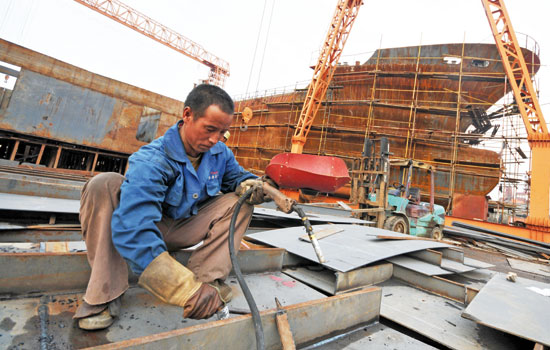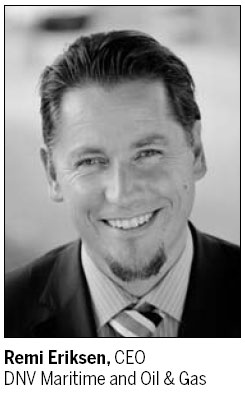Opportunities emerge as European shipping operators face financial woes
Det Norske Veritas, one of the world's leading shipping industry classification societies, says the time is ripe for Chinese shipyards to invest in European counterparts, as a way to raise their design capability, but also meet the challenges being posed by tougher environmental regulations.
|
 |
|
A worker at a shipyard in Taizhou, Zhejiang province. Some Chinese companies have made moves to invest in European shipyards, which are struggling financially. [Photo/China Daily] |

Despite a few big shipyards with a strong design capability, "Chinese yards in general lag behind the industry leaders such as South Korea and some European countries in customer service and diversification", Remi Eriksen, chief executive officer of DNV Maritime and Oil & Gas, said in an interview.
Shipping classification societies such as Norway's DNV are non-governmental organizations that establish and maintain technical standards for the construction and operation of ships and offshore structures.
Other leading names include Britain's Lloyd's Register and Germany's Germanischer Lloyd.
Industry analysts and observers said many European shipping operators are struggling financially at the moment, which has reduced their market values, making them vulnerable to takeover, and open to investment approaches.
Eriksen added that Chinese yards should consider buying or teaming up with European yards to strengthen their competitiveness.
Some Chinese companies have already started making moves.
Aviation Industry Corp of China, one of the largest State-owned aerospace companies, for instance, recently acquired Deltamarin Ltd, a Finland-based ship design company.
AVIC has expanded steadily into shipbuilding in recent years, and currently controls several shipyards in China, including one in East China's Shandong province and another in Jiangsu province.
Diao Weicheng, deputy general manager of AVIC International Investments Ltd, an offshoot of AVIC group, recently said: "We have gradually built up our ship design capability over the past few years and we are now trying to enhance our overall service capability."
Eriksen added that stronger ship design competence would help Chinese yards tackle the challenges posed by growing levels of environmental regulation being imposed on the global industry.
The European Union Commission announced on Oct 1 that it is to establish its own system next year, to curb carbon emissions from the shipping industry, which might include a fuel or carbon tax, mandatory emission reductions per ship, or inclusion in its Emissions Trading System, a system it imposed on the aviation sector.
There is currently no regulatory mechanism on greenhouse gases from the shipping industry, which experts suggest accounts for 3 percent of the world's total carbon dioxide emissions.
Without proper regulation, the volume is projected to surge to 18 percent by 2015, according to the International Maritime Organization.
The IMO and the United Nations' climate division have been trying to push for a regulatory mechanism, but their efforts have achieved little progress, say industry experts.
"Some regulations set up by the IMO have put a restriction on emissions of nitrogen oxide and sulfur from ships and these regulations will become tougher in the future," added Eriksen.
In addition, Chinese shipyards need to improve their energy-efficiency technologies, Eriksen said.
Because of the high price of oil, fuel costs currently account for some 80 percent of the costs of container operators.
Industry experts suggest that the latest technology can cut fuel costs by up to 20 percent, providing shipping companies with much-needed savings.
Eriksen added that faced with such technological and market challenges, "global industry consolidation is inevitable".
He said: "Under such circumstances, one needs to innovate in order to survive."
zhousiyu@chinadaily.com.cn
